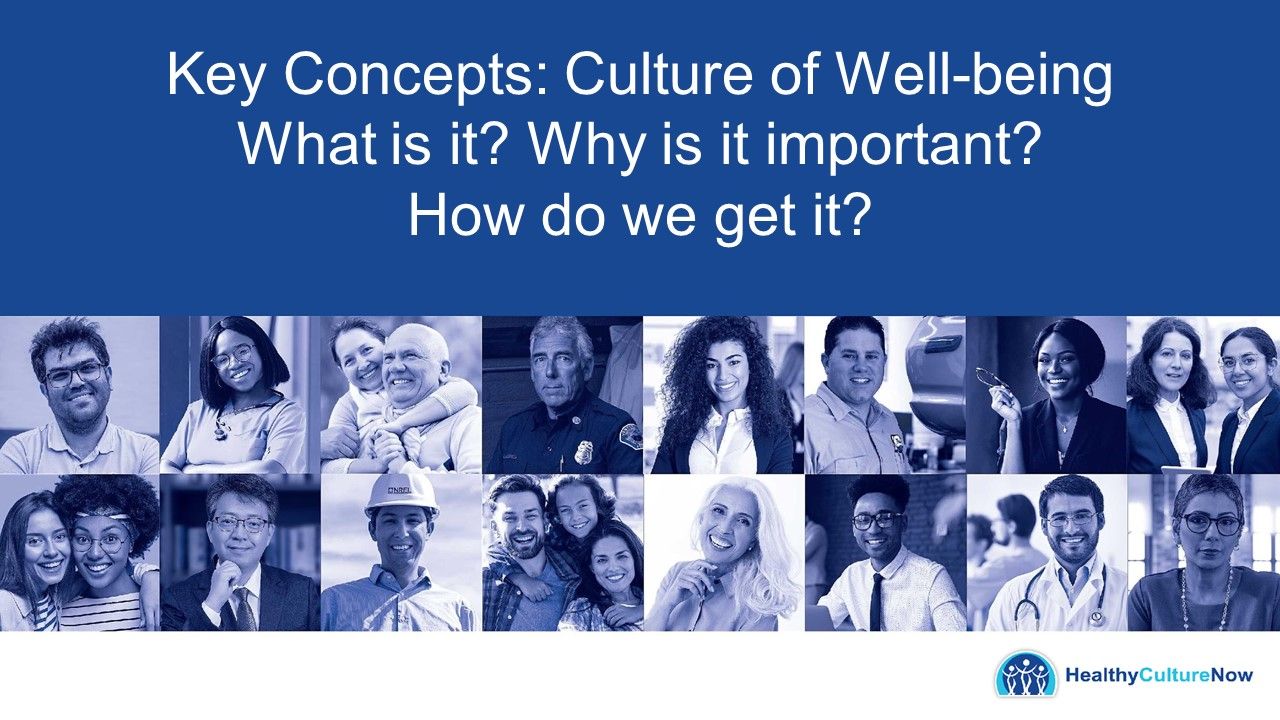The series were written by Judd Allen, Ph.D. and produced by Jake Hargrove. The music was composed and performed by Povel Popov. Episodes are narrated by:
Richard Safeer, MD, FACLM, FAAFP, FACPM, Chief Medical Director, Employee Health and Well-being at Johns Hopkins Medicine
Ewa Stelmasiak, MS, MSc, Founder, The Wellness Institute
Judd Allen, Ph.D., President, Human Resources Institute, LLC
Glen Caswell

Key Concepts
This series teaches how to define a culture of well-being, explain why it is important, and develop a culture-change plan. The series also explains how to conduct a cultural analysis and how the cultural approach to well-being addresses shortcomings in existing well-being programs.
Play Episodes
-
The Role of Human Resources Professionals, Benefits Managers and Wellness Program Managers in Creating a Culture of Wellbeing
-
Creating a Community Well-being Directory
-
Cultural Support Quiz
-
Establishing Well-being Norms
-
Supporting Sub-cultures
-
Conducting a Cultural Analysis
-
The Evolution to Well-being: Why are we constantly rebranding our work?
-
The Role of HR Professionals
-
Senior Leadership Support for Wellbeing

Fostering Well-being Values
This series explains strategies for establishing well-being as a primary cultural value. It defines cultural values and their relationship to other cultural dimensions such as norms and touch points. The goal is make the commitment to well-being real by embedding it in the culture.
Human resources and well-being professionals need to be able to make the case for well-being. It is important to identify a benefits list that will resonate with your audiences. It is also important to show that such a commitment is not superficial but has practical implications. This is not just “lip service.” Cultural support for well-being will help people achieve their personal goals.
Play Episodes

Aligning Cultural Touch Point Series
This series is for executives, managers and members of wellness committees/task forces seeking to bring about sustained culture change within their organizations. Many formal and informal policies and practices, also known as "cultural touch points," influence well-being values and behavior. Rewards, training and communication are some of the most obvious cultural touch points. This series introduces 14 primary cultural touch points and recommends strategies for aligning them with well-being.
Play Episodes
-
Series Overview: Aligning Cultural Touch Points
-
Learning and Training
-
Role Modeling
-
Rewards and Recognition
-
Push Back
-
Traditions
-
Communication
-
Relationship Development
-
Resource Commitment
-
The Built Environment
-
Onboarding
-
Story and Narrative
-
Roles and Responsibilities
-
Goal Setting and Planning
-
Laws and Policies

Social Climate Series
Social climate is also known as engagement, morale and teamwork. Three climate factors ─ a sense of community, a shared vision, and a positive outlook ─ contribute to both individual well-being and to important organizational indicators such as customer service, innovation, employee engagement, and teamwork. Where they are noticeably absent and people don’t get along, well-being suffers and productivity slows. This series defines each social climate element and recommends strategies for improving the work atmosphere.
Total listening time: 27 minutes
The concepts featured in this training are based on over thirty years of research and work by Robert Allen, PhD and Judd Allen, PhD.
Play Episodes

Strategies for Supporting Personal Purpose
We want our lives to matter. A sense of personal purpose is important to both individual health and to work performance. Our purposes include such endeavors as artistic expression, connecting to social groups, work, volunteering, religion and family. This series features field-tested initiatives that have been used by organizations to support a sense of purpose. You can select those approaches to purpose that are well suited to your workgroup.
Each episode describes an opportunity to support purpose at work. The goal is to select a few actions that are a good fit for your workgroup.
This series is based on the book, Leading for Purpose: How to Help Your People and Organization Benefit from the Pursuit of Purpose, by Judd Allen, Ph.D. and Donald B. Ardell, Ph.D.
Play Episodes
-
Overview: Cultural Support for Purpose Series
-
Provide Regular Feedback
-
Create a System for Peers to Honor One Another’s Efforts
-
Involve People in the Decisions that Affect Them
-
Set Challenging Goals for Individuals, Groups and the Organization
-
Follow Through on Current Goals Before Taking on New Ones
-
Help People See the Fruit of Their Efforts
-
Build Legacies
-
Limit Interruptions
-
Support Professional Development
-
Support Reflection and Centering
-
Help Make Sense of Disruptive or Unexpected Events
-
Engage Neglected or Forgotten Stakeholders
-
Write or Update the Mission, Vision and Values Statements
-
Offer a Compelling Story
-
Connect to Future Generations
-
Support Nature and Sustainability
-
Champion a Cause or Take a Principled Stand
-
Support well-being
-
Encourage Mutual-interest Groups
-
Encourage Creative Expression
-
Develop Win-win Solutions to Resolve Conflicts
-
Maintain Economic Transparency
-
Recognize Non-financial Compensation
-
Tailor Benefits to Individual Purpose
-
Promote Work-life Balance





